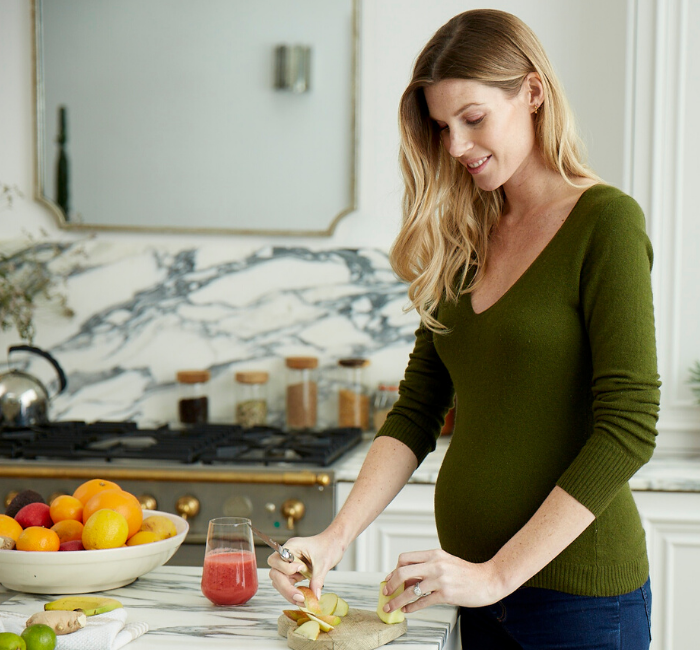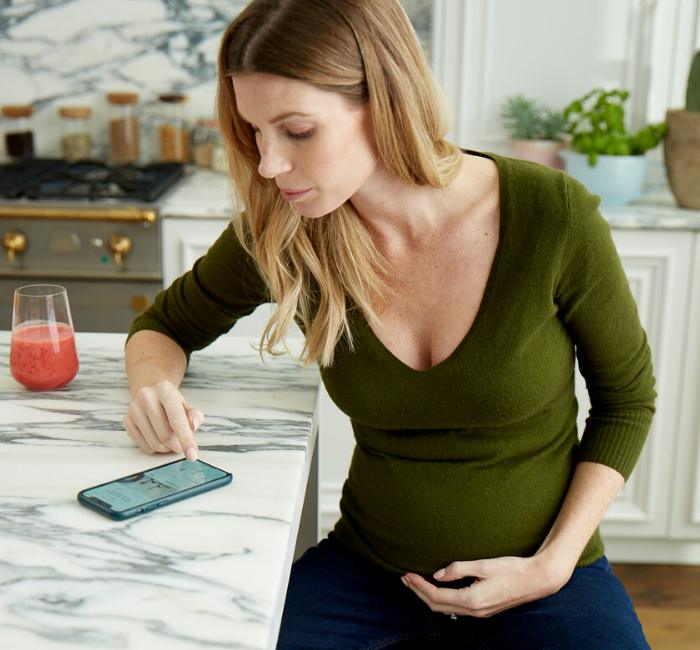What to Eat During Pregnancy
Your pregnancy diet is important for both you and your growing baby. Read on to discover what to eat and what not to eat during pregnancy.
Why Diet Matters
Eating a healthy diet during pregnancy ensures your baby gets all the nutrients they need to grow and develop properly. It also helps reduce your baby’s risk of going on to develop conditions like diabetes or heart disease in their later life.
But the benefits of a healthy diet go beyond your baby, helping to protect your health too. A recent study carried out by British and Scandinavian researchers found that diets rich in vegetables and fish lowered the risk of high blood pressure during pregnancy.
During your pregnancy, a healthy diet will also help to keep your energy levels steady (although fatigue during the first trimester is pretty much unavoidable!) and support healthy weight gain.

The good news is that for the most part, healthy eating during pregnancy is the same as healthy eating when you’re not pregnant, with a few exceptions. These include supplements and a small number of foods that you need to avoid or limit.
Eight Steps to a Healthy Balanced Pregnancy Diet
- Eat at least five portions of fruit and vegetables each day – a portion is around a handful or an individual piece of fruit like an apple or banana. If this sounds a lot, aim to include one portion with each of your meals, and then have two pieces of fruit for snacks.
- Include a starchy food (like bread, rice, potatoes or pasta) with each of your meals, choosing a whole grain whenever you can – try oats, wholemeal or rye bread, brown rice, wholemeal pasta. These provide more fibre, they are more filling and can help to keep energy levels steady.
- Add lean protein foods to at least two of your meals. These provide building blocks for your baby to grow. Meat (but not liver), poultry, eggs, fish, tofu and pulses are good sources.
- Be generous with calcium-rich foods like low-fat milk, yoghurt, and cheese. You need around 2-3 portions a day during pregnancy. If you don’t eat dairy, choose calcium-fortified milk, and include other calcium-rich foods. Learn which foods are calcium-rich on the Biamother app.
- Eat fish twice a week – and make one of these oily fish like salmon or mackerel. If you don’t like fish, consider an omega-3 supplement.
- Stay hydrated – water, fruit tea and skimmed milk are healthy choices. You can also include one small glass of fruit juice a day.
- Snack well by choosing snacks that are low in fat and sugar – these are kinder to your teeth (which are more vulnerable to decay during pregnancy) and will help you maintain a healthy weight during pregnancy. Find loads of healthy snack ideas on the Biamother app.
- Remember that you don’t need any extra calories until the final three months of your pregnancy – and even then it’s only a small change – about 200 extra calories a day.
What About Supplements?
There are two supplements that are recommended for all pregnant women – vitamin D and folic acid. If you are vegan or follow a mostly plant-based diet, there are some other nutrients (like omega-3 and iodine) which you need to consider.
During your pregnancy, there are some foods you’ll need to limit or avoid. Some of these foods carry a risk of food poisoning, while others can carry a small risk to your baby’s health. Here’s what you need to know.
What not to Eat During Pregnancy
The foods listed below are the ones to avoid. They can be hard to remember, so we recommend saving this article or taking a photo, so you have the information to hand.
Soft cheese with a white rind (also known as mould-ripened cheese): This includes brie, camembert and soft goat cheese.
Rinds are the outside shell on cheese that forms during the cheesemaking process.
Soft blue-veined cheese: This includes danish blue, gorgonzola and Roquefort.
These cheeses can contain a bacteria known as ‘listeria monocytogenes’, which can cause a rare but serious type of food poisoning known as listeriosis. During pregnancy, you are more at risk of contracting listeriosis, as your immune system is downregulated as a normal consequence of pregnancy hormones.
Listeria can grow in cheeses with high moisture and low acidity – which is why you need to avoid soft and mould-ripened cheeses, as they have more moisture and lower levels of acidity. However, these cheeses are safe if they are cooked until piping hot.
Other types of soft cheese are OK to eat (including cheese spread, cottage cheese and feta cheese), as long as they’re made from pasteurised milk. All hard aged cheeses (like cheddar and Parmesan) are safe to eat during pregnancy, even stilton. They have much lower moisture levels, so they are considered low risk.
Raw or undercooked meat: Raw and undercooked meat (like rare steaks or meat which is pink or has traces of blood in it) should be avoided, as they can carry a risk of toxoplasmosis.
Toxoplasmosis is an infection caused by the parasite Toxoplasma Gondii, which can be found in raw and undercooked meat, unpasteurised goat milk and cat poo. Although it normally only causes a mild infection in healthy adults, in pregnancy it can harm your baby, especially in the first few weeks of pregnancy.
While the risk of toxoplasmosis is low, it’s recommended that you only eat meat that has been thoroughly cooked, and take extra care to wash your hands, chopping boards and utensils thoroughly after preparing raw meat.
Raw cured meats: Cured meats like parma ham and salami which have not been cooked can also carry a risk of toxoplasmosis. There are two ways to reduce the risk – freeze the meat first or cook it. Both will destroy the parasites, making them safe to eat.
The advice from the NHS is to freeze raw cured meat for 4 days before eating, or cook them thoroughly as part of a recipe – for example adding salami to a pizza, or adding chorizo to a pasta dish.
Liver: Liver and foods made with liver (such as pate, liver sausage or haggis) should be avoided as they contain lots of vitamin A, which can harm your baby when consumed in large amounts. You should also avoid cod liver oil supplements for the same reason.
Pate: All types of pate should be avoided during pregnancy, including vegetable pate. This is because they can carry a food poisoning risk.
Certain types of fish: Eating fish is part of a healthy pregnancy diet, but large fish like shark, swordfish and marlin contain high levels of a compound known as methylmercury. This can be harmful to your baby, so these fish should be avoided.
You should also avoid eating raw shellfish (mussels, lobster, crab, prawns, scallops and clams) as they carry a risk of food poisoning. Cold prawns that have been cooked already are safe. Smoked fish, like smoked salmon and trout is also considered safe.
Alcohol: In the UK, The Chief Medical Officers’ advice is that if you are pregnant (or planning to become pregnant) the safest approach is not to drink alcohol at all, which keeps risks to your baby to a minimum. Read more about this advice here.
Liquorice root: The herbal remedy liquorice root contains high levels of a substance known as glycyrrhizin, which has been linked to developmental problems. As a precaution, pregnant women are advised to avoid this herbal remedy. However, you can have a moderate amount of liquorice sweets or liquorice tea safely.

A note on raw or partly cooked eggs:
In the UK, eggs that are stamped with the red lion are safe for pregnant women to eat raw or partially cooked. If they are not Lion Code, make sure eggs are thoroughly cooked until the whites and yolks are solid to prevent the risk of salmonella food poisoning.
Foods to Limit During Pregnancy
The foods listed below don’t need to be avoided, but there are recommendations about how much is safe to consume.
Caffeine: Maximum 200mg a day
At high levels, caffeine can increase the risk of low birth weight. For this reason, it’s recommended that you limit your caffeine intake to 200 milligrams a day. This is equal to about 2 cups of instant coffee, but filter coffee and coffee from a coffee shop can be much stronger. Read our advice on caffeine here.
Herbal teas: Maximum 4 cups a day
Herbal teas are free from caffeine, but we don’t have much information on the effects of herbs on a growing baby. For this reason, it’s recommended you drink no more than 4 cups of herbal tea a day during pregnancy. It’s also a good idea to vary the types of herbal tea you drink, so you’re not consuming larger amounts of one type of herb.
Oily Fish: Maximum two serves a week
Oily fish (like salmon, mackerel and sardines) are an important source of omega-3 for you and your baby, and they’re part of a healthy diet during pregnancy. However, oily fish can contain contaminants like dioxins and PCBs (polychlorinated biphenyls) that can be harmful if they build up in the body, so it’s recommended that you eat no more than two portions of oily fish a week.
Tuna: Maximum 2 tuna steaks or 4 cans of tuna a week
Tuna can also contain dioxins and PCBs, so the advice is to eat no more than 2 tuna steak or 4 cans of tuna per week.

